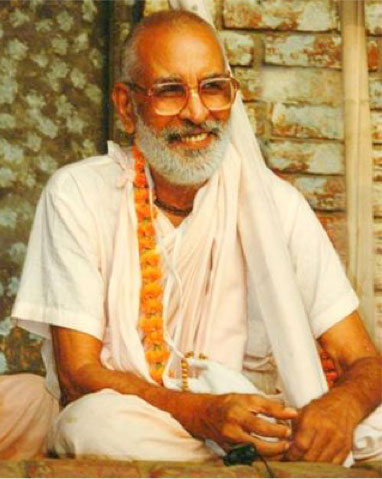sri sri guru gauranga jayatah!

Year 2, Issue 7, Amāvasyā
Speical Edition
Posted: 20 July 2020
Dedicated to and Inspired by
nitya-lila pravista om visnupada
Śrī Śrīmad Bhaktivedānta Nārāyaṇa Gosvāmī Māhārāja
Everything is Accomplished by Hearing Hari-kathā (Part 1 of 3)

How can one know Bhagavān? Only by His mercy can one know Him. How can one attain that mercy?
jñāne prayāsam udapāsya namanta eva
jīvanti san-mukharitāṁ bhavadīya-vārtām
sthāne sthitāḥ śruti-gatāṁ tanu-vāṅ-manobhir
ye prāyaśo ’jita jito ’py asi tais tri-lokyām
Śrīmad-Bhāgavatam (10.14.3)
[Śrī Brahmā is eulogizing Śrī Kṛṣṇa: O unconquerable one, in this universe there are those who do not make even a slight separate endeavour to obtain knowledge of Your nature and form, Your majesty and Your greatness. They maintain their existence by staying near Your bhaktas and hearing and serving with their body, mind and words the narrations of Your names, forms, qualities and pastimes, which automatically flow from Your bhaktas’ lips. Although You are ordinarily unconquerable, meaning no one in the three worlds can defeat You, You are conquered by such individuals.]
How can one who cannot be conquered by anyone in the three worlds possibly be conquered by the practice of jnana? What does “the practice of jnana” mean? It means to constrain the tendency of the mind (citta-vṛtti). What does it mean to constrain the tendency of the mind? The māyāvādīs, advaitavādīs think it means na iti (not this), na iti, na iti. This is indeed their prominent understanding. They consider, “Is this brahma (supreme spirit)? No. Is this brahma? No. Is this Brahma? No, not this.” They stretch this to the maximum extent, always concluding, “No, no, no, no – na iti, na iti.” This type of endeavour will not do.
Therefore, jñāne prayāsam udapāsya. Jñāna (knowledge), japa* (utterance of the Viṣṇu mantra), tapa (austerity), svādhyāya (self-study), homa (fire-sacrifice) – leave them all. Don’t trust those methods; they will cheat you. Śrīla Viśvanātha Cakravartī Ṭhākura says, “itat api akṛtvā – do not endeavour the slightest for jñāna.” What type of jnana? [It is known that] nirviśeṣa-jñāna (knowledge of the impersonal aspect of Bhagavān) is detrimental to bhakti. The prohibition referred to here is not just in relation to nirviśeṣa-jñāna. Are! Do not slightly endeavour for even the tattva-jñāna that Kṛṣṇa is Bhagavān, the condensed embodiment of eternity, consciousness, bliss (sac-cit-ānanda), para-brahma (supereme brahma) and the source of all avatāras. Leave all that, also. Such tattva-jñāna is not helpful for bhakti. Jñāna-karmādy anāvṛtam – [bhakti should be] uncovered by jñāna and karma” (Bhakti-rasāmṛta-sindhu 1.1.1). Even leave parikramā of places of pilgrimage. That also will not do.
____
[* The essential meaning is that one should not chant when one has the opportunity to hear hari-kathā from an exalted Vaiṣṇava.]
Devotee: But what if someone’s qualification is for that?
Śrīla Gurudeva: You should understand your respective qualification in light of what is being explained here.
Devotee: Why is tattva-jñāna forbidden?
Śrīla Gurudeva: By tattva-jñāna, one receives an understanding of Kṛṣṇa’s universal form or of His nārāyaṇa-tattva, which is endowed with opulence. The enchanting moods of the bāla-gopāla form of Kṛṣṇa, who, wearing garlands of forest-flowers, steals yoghurt and butter from others’ houses, will not come to a person who focuses solely on tattva-jñāna. Rather, aiśvarya-buddhi (the mood of awe and reverence) will come to him.
Devotee: Is sambandha-jñāna (knowledge about one’s relationship with Kṛṣṇa) not required?
Śrīla Gurudeva: Nothing is needed. Nothing is needed.
Devotee 2: Does this mean that sambandha-jñāna is not needed?
Śrīla Gurudeva: Nothing is needed. This is certainly what is said here. Nothing is needed. All that is needed is [faithful and submissive] aural reception of hari-kathā. Everything will be received solely through this hari-kathā – tattva-jñāna, sambandha-jñāna, sadhana-bhakti, bhava-bhakti, prema-bhakti – whatever exists. Do not endeavour separately for anything.
What sambandha-jñāna is greater than hearing of Mother Yaśodā’s activities with Kṛṣṇa or the dealings of the sakhas with Him? This is indeed the crest-jewel of all sambandha-jñāna and also the crest-jewel of all tattva-jñāna. Tattva-jñāna will not be obtained by anything else, nor will sambandha-jñāna. Will tattva-jñāna be acquired by reading Yoga-vāśiṣṭha (an impersonal text about Bhagavān, originally authored by Sage Vāśiṣṭha)? Or by learning anything else? What remains to be uncovered for one who hears the hari-kathā of Śrīmad-Bhāgavatam from the beginning? Therefore, no separate endeavour is needed. One should hear hari-kathā with great śraddhā (transcendental faith). In order to create that śraddhā, he (Śrīla Viśvanātha Cakravartī Ṭhakurā) has described na tat prayāso kartavyam’. Do not endeavour separately for anything. Through the medium of hari-kathā only, everything will be attained. How should one serve hari-kathā? Namanta eva (submissively).